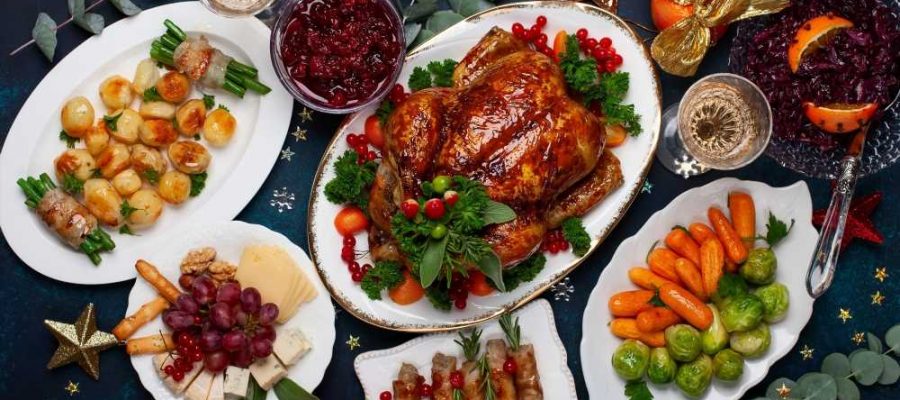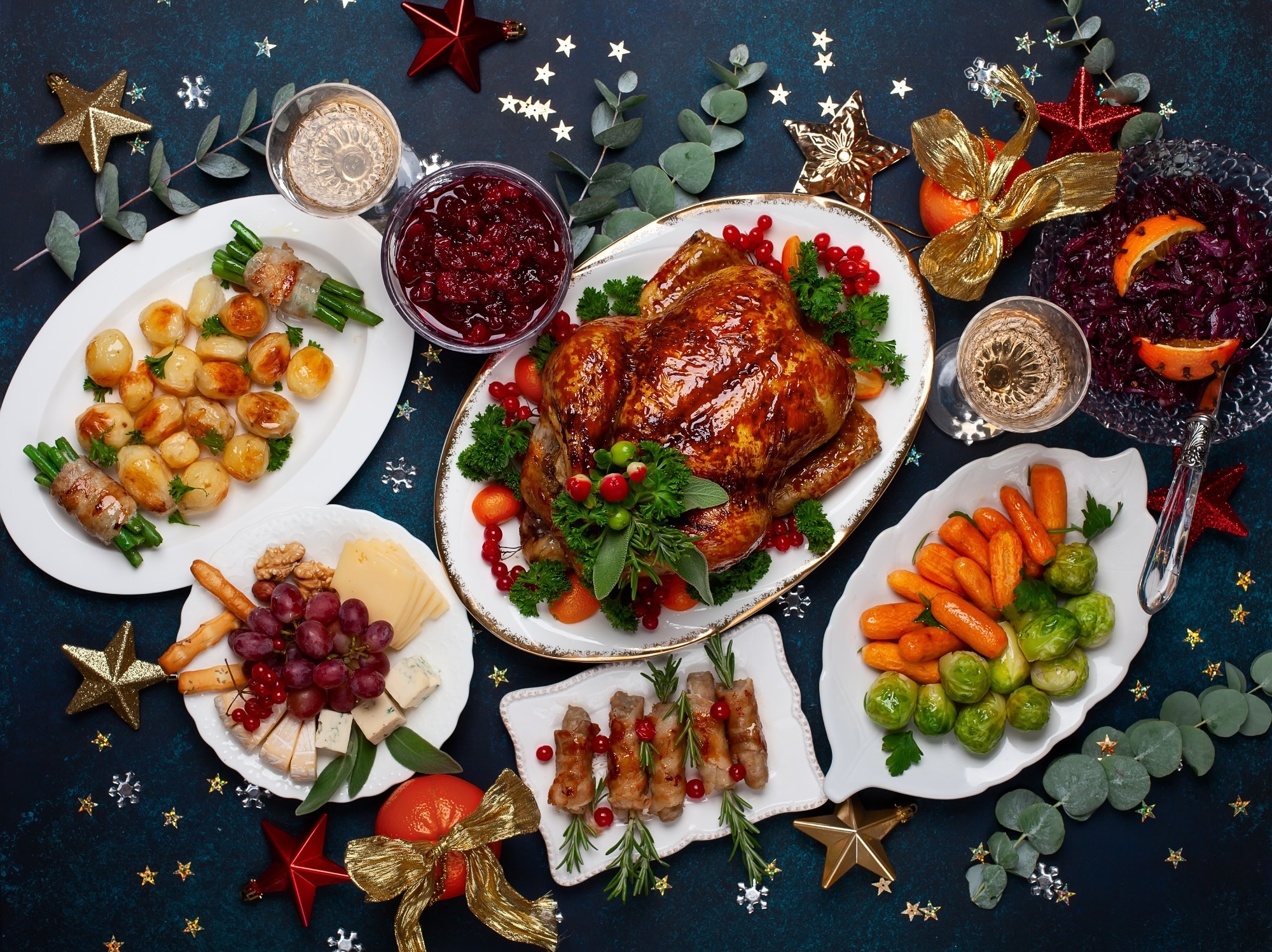
How does Christmas impact eating behaviors and obesity?
In a recent study published in the Nutrients Journal, researchers conducted a systematic review to evaluate changes in nutritional patterns and eating behavior during the winter holiday season and its association with obesity to improve strategies for intervention and prevention.
 Study: Winter Holidays and Their Impact on Eating Behavior—A Systematic Review. Image Credit: Kolpakova Svetlana/Shutterstock.com
Study: Winter Holidays and Their Impact on Eating Behavior—A Systematic Review. Image Credit: Kolpakova Svetlana/Shutterstock.com
Background
Obesity is a growing health concern worldwide and is a risk factor for various diseases and the fifth most prevalent cause of mortality worldwide. Approximately 35% of the European population is overweight, and nearly 13% are obese.
The problem of obesity is much larger in the United States, with about two-thirds of the country’s adult population being overweight or obese. Furthermore, nearly half the adult population is prediabetic or diabetic — a disease strongly influenced by obesity.
With the growing interest in understanding the underlying causes of obesity and developing strategies for weight loss, programs to bring about substantial lifestyle changes have been the gold standard in intervention strategies.
However, despite the initial success of such lifestyle-altering strategies, sustaining a healthy weight over time is a challenge. While genetic and physiological factors contribute to regaining weight, external influences also play a major role.
Even in cases where patients strictly adhere to a balanced diet and physical activity to sustain a healthy weight after significant weight loss, the holiday season tends to be a period where some of these rules are abandoned.
The increased consumption of sugary drinks and desserts during the holidays often results in weight gain that is not subsequently reversed.
About the study
In the present study, the researchers aimed to investigate patterns of eating behavior and periods in an individual’s life where they are especially vulnerable to weight gain. To this end, they conducted a systematic review to understand eating behaviors and the impact of food during the winter holiday season.
The included studies were published in the English language, examined a study group consisting of adults, and were not restricted by the study design.
Studies that focused on participants under 18, or groups with specific comorbidities, or examined the impact of weight-loss interventions such as intermittent fasting during the holiday season were excluded.
Studies involving adolescents and children were excluded since these groups have very different caloric needs and food patterns than adults.
Major findings
The findings suggested that most participants from the various studies included in the systematic review experienced weight gain during the holiday season. In most cases, the weight gained during the holidays had not been shed or lost even towards the end of the study period, well after the holiday season.
Various studies that examined weight gain during the holidays reported that individuals with higher initial body mass indices (BMIs) gained more weight during this period than those with normal BMIs. Furthermore, the subsequent shedding of the extra weight was not as evident in individuals with higher-than-normal BMI.
The review also discussed the different constituents of various traditional Christmas foods in different countries and their caloric content.
The traditional holiday meals described in the review included those from European countries such as Romania, Greece, Italy, Spain, Norway, Germany, Great Britain, and France, as well as regions of North America, South America, and Asia.
Behavioral patterns associated with food and weight gain were also investigated in the review, and the findings indicated that overweight individuals perceived food differently from those with normal BMIs.
Cues such as the smell and sight of food resulted in a much stronger desire to consume the food in overweight individuals than those within the normal weight range.
Furthermore, the multisensory facets of eating experiences were also found to vary according to seasonal changes, with specific foods associated with hot or cold seasons.
Additionally, the researchers discussed how psycho-social factors can influence eating behaviors during the holiday season since these periods can be especially stressful for some individuals, resulting in increased food and caloric consumption.
They believe that instead of extreme strategies after the holiday season to shed the weight gained during the holiday period, it is essential to maintain sustainable strategies such as regular exercise and self-monitoring to prevent excessive weight gain.
Conclusions
The review found that the holiday season resulted in weight gain in individuals with normal and greater than normal BMIs.
However, overweight or obese individuals gained more weight than those with normal BMIs and found it more difficult to shed excess weight after the holiday season.
The findings indicate the need to develop sustainable, multifaceted, and effective intervention and prevention strategies that are useful throughout the year, especially during the holiday season, in helping maintain a healthy weight.
Abdulan, I. M., Popescu, G., Maștaleru, A., Oancea, A., Costache, A. D., Cojocaru, D.-C., Cumpăt, C.-M., Ciuntu, B. M., Rusu, B. and Leon, M. M. (2023) Winter Holidays and Their Impact on Eating Behavior-A Systematic Review, Nutrients. doi: https://doi.org/10.3390/nu15194201. https://www.mdpi.com/2072-6643/15/19/4201
Posted in: Medical Condition News | Miscellaneous News
Tags: Adolescents, Children, Cold, Diet, Exercise, Fasting, Food, Genetic, Language, Mortality, Nutrients, Obesity, Physical Activity, Weight Loss
.jpg)
Written by
Dr. Chinta Sidharthan
Chinta Sidharthan is a writer based in Bangalore, India. Her academic background is in evolutionary biology and genetics, and she has extensive experience in scientific research, teaching, science writing, and herpetology. Chinta holds a Ph.D. in evolutionary biology from the Indian Institute of Science and is passionate about science education, writing, animals, wildlife, and conservation. For her doctoral research, she explored the origins and diversification of blindsnakes in India, as a part of which she did extensive fieldwork in the jungles of southern India. She has received the Canadian Governor General’s bronze medal and Bangalore University gold medal for academic excellence and published her research in high-impact journals.